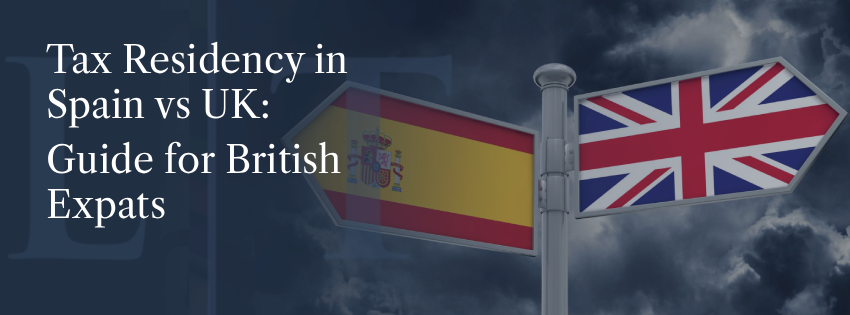Tax Residency in Spain vs. the UK: The 183-Day Rule and Other Key Tests
For many UK citizens — retirees seeking sunshine, digital professionals working remotely, or families relocating for lifestyle reasons — moving to Spain is an exciting opportunity. However, one of the first and most important questions to resolve is:
👉 Where will you pay your taxes — in Spain or in the UK?
Tax residency determines whether you are taxed only on Spanish income or on your worldwide income. While many people believe the 183-day rule is the only test, Spain applies other criteria — including family ties and economic interests — and courts have issued rulings confirming this broader approach.
At Lextax, we help British nationals moving to Spain understand the rules, avoid costly mistakes, and plan their tax situation effectively.
1. When Are You Tax Resident in Spain?
Under Spanish tax law (Ley del IRPF, Art. 9), you are considered tax resident in Spain if any of the following apply:
- You spend more than 183 days in Spain in a calendar year.
- Days of travel count.
- Temporary absences are treated as days in Spain unless you can prove tax residency elsewhere (e.g., UK tax certificate).
- The Spanish Supreme Court (STS 28-11-2017, Rec. 2082/2017) confirmed that the burden of proof is on the taxpayer.
- Your main economic interests are in Spain.
- If you run a business, hold directorships, or have substantial investments in Spain, you can be considered resident even with fewer than 183 days.
- The National High Court (SAN 19-02-2004) held that significant shareholdings in Spanish companies may establish residency.
- Your spouse and minor children habitually live in Spain.
- Spanish law presumes you are resident if your close family is here.
- This presumption is rebuttable but requires strong proof of family residence abroad (TEAC Resolution 15-09-2016).
2. UK Tax Residency Rules
In contrast, the UK applies the Statutory Residence Test (SRT), which is more rules-based:
- Automatic Overseas Test – You are non-resident if you spend fewer than 16 days in the UK (if resident in one of the last three years).
- Automatic UK Test – You are UK tax resident if you spend at least 183 days in the UK, or if the UK is your only home.
- Sufficient Ties Test – Family, accommodation, work, and past UK presence are considered.
This system provides more certainty than Spain’s approach, but conflicts still occur for people with lives spread across both countries.
3. Double Taxation: Spain–UK Treaty
If both Spain and the UK claim you as a tax resident, the Spain–UK Double Taxation Convention (2013) applies. Its tie-breaker rules decide residency:
- Permanent Home – Where you own or rent your main home.
- Center of Vital Interests – Where your family and main economic ties are.
- Habitual Abode – Where you usually spend more time.
- Nationality – A last resort.
If still unresolved, the tax authorities of both countries must reach an agreement.
4. What the Courts Say in Spain
Spanish courts have interpreted tax residency rules strictly:
- STS 28-11-2017 – Absence of proof of UK residence led to Spain considering the taxpayer resident.
- SAN 19-02-2004 – Economic ties in Spain (business activity) were enough to establish residency.
- STS 28-06-2021 (Rec. 1990/2020) – Temporary absences were still counted as days in Spain.
👉 The message is clear: Spain does not rely only on “days counted”; economic and family links can tip the balance.
5. Common Traps for UK Nationals Moving to Spain
Many British expats fall into these pitfalls:
- Believing that spending fewer than 183 days avoids Spanish residency.
- Not realizing that family living in Spain makes them presumed residents.
- Keeping a business or directorship in Spain without planning residency consequences.
- Failing to declare worldwide income in Spain once resident.
- Assuming a UK tax certificate automatically exempts them from Spanish taxation.
6. Practical Advice for UK Citizens Planning a Move
- Track your days carefully – Keep travel records and boarding passes.
- Plan your move date strategically – Consider how part-year residency may affect tax filings.
- Review pensions and investments – UK pensions and ISAs may have different treatment in Spain.
- Check inheritance tax exposure – Spain applies inheritance tax differently, and planning is key for families with assets in both countries.
- Get professional advice early – Avoid residency disputes by structuring your affairs in advance.
7. How Lextax Supports UK Nationals
At Lextax, we guide UK citizens relocating to Spain through every step:
- Residency analysis – Clear determination of where you are tax resident.
- Cross-border planning – Coordinating your UK and Spanish obligations.
- Tax return compliance – Filing correctly in both countries with treaty relief.
- Audit defense – Representing you before Spanish tax authorities in residency disputes.
- Wealth & estate planning – Ensuring your family’s assets are protected across jurisdictions.
We make Spain’s complex tax system understandable, so you can move with confidence.
FAQs: Residency Spain vs UK
If I spend more than 183 days in Spain, am I automatically tax resident?
Yes, unless you can prove tax residency in another country.
Can I be resident in both Spain and the UK?
Yes, under domestic laws, but the treaty will determine your final residency for tax purposes.
Does owning a house in Spain make me tax resident?
Not by itself, but combined with family or economic ties, it may.
Do temporary absences reduce my day count in Spain?
Not unless you prove tax residency elsewhere. Spanish courts count absences as days in Spain.
How do pensions from the UK get taxed in Spain?
Private pensions are usually taxed in Spain if you are resident, while government pensions are generally taxed in the UK.
Conclusion
For British nationals moving to Spain, tax residency is the cornerstone of financial planning. The Spanish rules are broader than many expect, and the consequences of misinterpreting them can be severe.
By understanding the 183-day rule, the family and economic interests tests, and how the Spain–UK treaty operates, UK citizens can move to Spain with clarity and peace of mind.
At Lextax, we specialize in helping UK expats translate complexity into certainty, ensuring their move to Spain is both enjoyable and financially secure.
👉 Thinking of relocating to Spain from the UK?
Contact Lextax today for a tailored residency and tax planning consultation.


